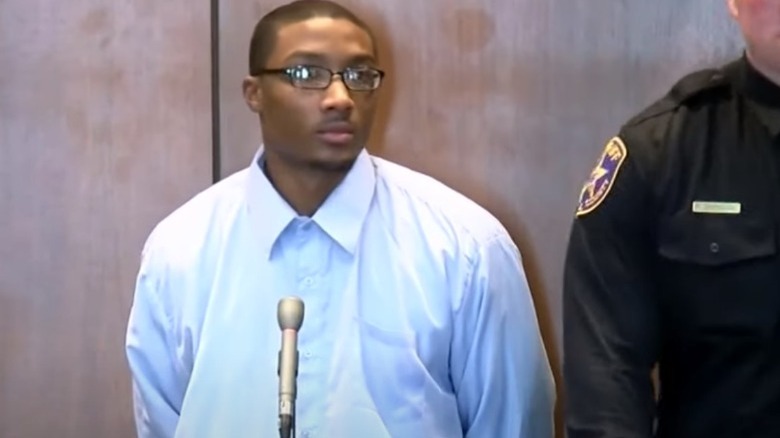Killers Who Used Dating Apps To Find Their Victims
According to Statista, the number of dating app users has risen to 44.2 million in 2020. Just taking into account the sheer number of users, it seems likely that some are there for nefarious purposes.
Investigation Discovery says that the first serial killer known to have used the internet as a hunting ground was John Edward Robinson. Married since the 1960s and with a history of convictions for crimes including embezzlement and check forgery, it wasn't until 2000 that The New York Times reported on his arrest in connection with crimes committed under the pseudonym "Slavemaster." Bodies were recovered from inside plastic-wrapped barrels on his property, and the internet was never the same.
Fast forward to 2022, when NBC was reporting on a dating profile that was spotted by the friend of a man who had been killed in 2019. The profile belonged to the man who had been found not guilty of Brad Jackson's murder by reason of insanity: Pankaj Bhasin had been committed to a mental health facility for several years before being released. There were strict conditions placed on that release, and shortly after the dating profile went public, NBC further reported that courts ruled that he was to stay off social media (with the exception of LinkedIn). Sarah Bryen — who first flagged the profile — explained, "When you meet someone online, you never know who you're going out on a date with for the most part. It could be a guy who stabbed someone 53 times."
Anthony Eugene Robinson
At first, he was only known as the Shopping Cart Killer, as authorities reported this was his preferred way of transporting the bodies of his victims for disposal. In January 2022, WUSA9 reported that authorities had identified the remains of a woman they believed to be the fifth victim of a killer who was hunting on the dating sites Tagged and Plenty of Fish. Then, in September of the same year, NBC Washington reported that authorities were connecting a sixth victim to the same killer — and they also alleged that the killer was Anthony Eugene Robinson. Just days later, Robinson was indicted on a series of charges including first-degree murder (via NBC Washington).
According to The Washington Post, another woman who made contact with him on a dating site came forward to share what happened to her. Monica White said that their online chats turned into daily video calls, during which she said Robinson was initially charming. White said that he had mentioned his fiancée, who had died unexpectedly: That was Skye Allen, who was named as the potential sixth victim.
White said that the relationship came to an end after an intoxicated Robinson made sexual comments toward her son: They fought, police were called, and the first person killed in connection with the Shopping Cart Killer died about eight months after. "It really rocked my world. I went into a depression," White said.
Jesse Kempson
British backpacker Grace Millane disappeared in New Zealand in 2018: Her remains were found not long after she was reported missing, and according to the BBC, authorities immediately zeroed in on someone she met on Tinder. He initially couldn't be named in the press coverage — even when he was found guilty — because he was due to go on trial in two other cases (via the Supreme Court of New Zealand). In late 2020, the BBC reported that he had been found guilty in those as well, which involved violent sexual assaults involving two other women that he had also met on Tinder.
1News also reported that one woman had gone to the police immediately after the suspect — finally named as Jesse Kempson — had threatened her with a knife. In spite of the statement she gave at the time — 18 months before Millane's death — law enforcement had ruled there wasn't enough evidence to pursue the matter further and only granted the victim a protection order. She was later quoted as saying, "Jesse's trajectory ... was always going to end up the way it was, but it could have been avoided if they had taken me seriously."
During the trials, it was revealed that before he had even disposed of Millane's body, Kempson had been messaging someone else via the dating app. She, says the BBC, came forward to share her story: He had been relentless enough to make her uncomfortable, and when her gut told her that something was wrong, she listened.
Kane Thomas Fairbank
After his arrest in 2022, charges were immediately filed against Kane Thomas Fairbank. The 18-year-old from Utah faced a slew of charges, including attempted aggravated murder and aggravated kidnapping, which KUTV reported were connected to two stabbing incidents.
According to ABC News, the first victim was an 18-year-old who had met Fairbanks on Tinder: Authorities claim that after they met up, he stabbed her repeatedly with a 12-inch knife. After escaping from his vehicle, she ran for help to bystanders who did help her. After running and ditching his car, he approached and stabbed a second victim, a 64-year-old woman who seemed to have simply been in the wrong place at the wrong time. He admitted to the stabbings after his arrest, and law enforcement said that wasn't all he admitted to.
Court documents revealed (via KJZZ): "When asked what would have happened if he had not been arrested, [Fairbank] advised that he would have wanted to find more people to do the same thing. He said he had fun and would want to do it again." Prosecutors claim that he had seen killing his Tinder date as key, and that he had held off committing a series of other, planned murders — which included the killing of his immediate family — until he had carried through with this first step. Both victims ultimately survived.
Aubrey Trail and Bailey Boswell
The remains of 24-year-old Sydney Loofe were discovered about two weeks after she was reported missing on November 15, 2017. She had been dismembered, stuffed into garbage bags, and discarded in the fields of rural Nebraska. According to the Associated Press, Aubrey Trail and Bailey Boswell (pictured) were convicted of her murder: The jury found that claims she had died accidentally were unlikely in the face of evidence that included the purchase of heavy-duty tools — perfect for dismembering — early on the day of her death.
The Washington Post says that it was Loofe herself who led authorities to her killers: Her last post to Snapchat was a hopeful one, in which she wrote, "Ready for my date". That was with Bailey Boswell — they had matched on Tinder.
Prosecutors said that Trail and Boswell — who were dating at the time of the murder — used Tinder with the specific goal of getting Loofe to their home. Boswell was convicted of first degree murder, as per AP, and although there was the possibility she would be given the death sentence, CBS reported that she was ultimately given life in prison. Trail, however, was given the death penalty but argued that because he had attempted to cut his own throat at his trial, he should be given a new one. Nebraska courts disagreed, saying it was a clear attempt at nothing more than guaranteeing a mistrial.
Stephen Port
One of the most notorious serial killers in recent British history was Stephen Port (pictured right). According to the BBC, he used the dating app Grindr to target his victims, striking up conversations with them before meeting them, drugging them with lethal doses of gamma-hydroxybutyrate (GHB), sexually assaulting them, and then finally killing them and disposing of their remains not far from where he lived. His victims — Gabriel Kovari, Daniel Whitworth, Jack Taylor (pictured left), and Anthony Walgate — ranged in age from 21 to 25.
Even as the justice system promised that Port would never be released from jail, attention turned to the Metropolitan Police. The BBC reported that Port had been arrested and released after the discovery of his first victim, Anthony Walgate. Although there were circumstances surrounding his death that were seemingly more than enough to warrant further investigation, it was deemed "not suspicious at the moment."
The investigation led to monetary settlements with the families (which were made public in a shocking release that families condemned in The Guardian), along with changes in the designations assigned to deaths being investigated by law enforcement (via the BBC). When it was announced that actor Stephen Merchant was going to be playing Port in a film called "The Barking Murders," Port's sister, Sharon, relayed to The Sun, "He thinks it makes him look really bad, and Stephen Merchant does not look anything like my brother."
Joel Osei and Diana Cristea
In 2020, the BBC reported that London law enforcement made two shocking discoveries within days of each other, starting with the body of an unnamed, unconscious 40-year-old man on May 30. Several days later, the body of Royal Academy of Dance choreographer Adrian Murphy was discovered in his apartment. The two were connected by the presence of a drug called scopolamine in their systems: Also known as "the devil's breath," the highly toxic substance can — depending on the levels administered — incapacitate victims completely, or kill them (via WebMD).
Murphy was found to have had a lethal concentration of scopolamine in his system at the time of his death, said the BBC. Guilty verdicts were handed out by October, when Crown Prosecution Services reported that 25-year-old Joel Osei and 19-year-old Diana Cristea were found guilty of a slew of charges, including murder, fraud, and theft.
Osei used his Grindr account to make contact with targets, who would be drugged while he went on to steal valuables that Cristea would sell. Murphy and the unnamed survivor had been targeted two days apart and were taken for thousands of dollars. Cristea turned her partner in after an argument, and according to The Irish Times, Osei was ultimately sentenced to 32 years in prison, while Cristea was given 16 years. The conviction came with help from the unnamed victim, which prosecutors gratefully acknowledged.
Mark Latunski
During the Christmas season of 2019, a family's worst nightmare unfolded: 25-year-old Kevin Bacon's body was discovered hanging from the rafters in the home of a man he'd met on Grindr. Mark Latunski was arrested, and according to the Detroit Free Press, he gave a full confession as to how he had not only murdered the aspiring hairdresser but cannibalized him as well.
Latunski had been on police radar for some time — particularly after his wife filed for divorce in 2013. She claimed that not only did he often stop taking the medication prescribed to treat his diagnosed depression, anxiety, and schizophrenia, but that he had kidnapped their children, forcibly restrained her, and falsely accused her of attempted murder. It also came out that Bacon wasn't the only person he had lured to his home via the dating app.
After the discovery of Bacon's remains, it was revealed that at least two other men had previously met up with Latunski via Grindr: Both had fled his home fearing for their lives. MLive requested and received a copy of the 911 call made by one man, who called authorities after escaping from his home in October. They further reported that authorities were called again in November when a second man fled to a nearby home looking for help, but no criminal charges were filed and police said there was little they were able to do at the time. WNEM News later reported that Latunski had been sentenced to life in prison. Parole was not on the table.
Kahlil Wheeler-Weaver
The Essex County Prosecutor's Office says that New Jersey City University college student Sarah Butler was killed on November 22, 2016, and her remains were discovered about a week later. There are a few different reactions to losing a loved one to a vicious murder, and Butler's friends weren't content with sitting back with thoughts and prayers. The Associated Press says they took over her social media accounts and turned her killer's game against him: When he arrived at the meet-up, police were waiting.
In October 2021, Kahlil Wheeler-Weaver was sentenced to 160 years behind bars — and while he would eventually be eligible for parole, that wouldn't be until he served 145 years. In addition to Butler's death, he was also linked to the murders of Joanne Brown and Robin West. Another targeted victim, Tiffany Taylor, survived, and her testimony — along with the online detective work of Butler's friends — was credited with securing the conviction.
At Wheeler-Weaver's trial, evidence was presented that showed a pattern: He had used dating apps to meet the women, who he then strangled, killed, and dumped. According to ABC, Wheeler-Weaver continued to claim innocence. Meanwhile, families of the victims banded together to support each other and Taylor, who testified, "My whole life is different; I don't wear makeup anymore; I don't have friends. I'm always paranoid. But I'm happy to still be here." In 2022, CBS reported that Wheeler-Weaver was being charged with a fourth murder. The victim was 15 years old.
Carl Langdell
Carl Langdell had already had run-ins with law enforcement — according to the BBC, he had been convicted of threatening to kill two people three weeks before he started chatting with history teacher Katie Locke on Plenty of Fish. They met up for their first date on Christmas 2015, headed to a hotel after having a few drinks, and that, says HertsLive, is where Langdell killed her and sexually assaulted her body, before disposing of her.
Langdell pleaded guilty, was sentenced to life in prison, and died in 2021. The cause of death was given as complications from a severe throat injury. Details about his death were scarce, but according to advocates, it was a lack of details — and sharing of information — that opened the door and allowed Locke's death to happen in the first place.
An investigation into Langdell revealed that not only was he serving a suspended sentence for threats, but that he had threatened to kill himself, revealed fantasies about killing women and necrophilia to a psychiatric nurse, had assaulted his brother and a girlfriend, and had records with no less than five law enforcement and mental health agencies. At the time of Locke's murder, he was also reportedly dating several women and talking to around 20 across a series of dating sites. The Herts Advertiser reported that the agencies' oversights rallied support for overhauling the systems that had failed to keep her safe.
Chance Seneca
In January 2023, Louisiana native Chance Seneca was sentenced to 45 years in prison. Was it enough? No — not according to his victim, who survived a brutal attack that prosecutors said was designed as an attempt to mirror the crimes of Jeffrey Dahmer.
Like Dahmer, Seneca was accused of targeting gay men — and using the dating app Grindr to do it. After striking up a weeks-long conversation with 18-year-old Holden White, The New York Times reports that Seneca carried out a series of grisly attacks that included stabbing him with an ice pick. After a failed attempt at dismemberment, Seneca summoned law enforcement and was arrested at the site. White miraculously survived and spent days in a coma, and when news of the sentencing reached him, he said, "It's not what I asked for. Life is what I asked for."
Seneca claimed that he hadn't been able to carry out his Dahmer-esque plan once he had seen White's bones, but according to The United States Department of Justice, he later confessed that he had fully intended on not only keeping body parts as souvenirs but continuing to meet up with, kill, and cannibalize gay men with the help of the dating app. KATC ABC News reported that after the initial sentencing, there was still a likelihood that White would get to see at least a few more years added to Seneca's sentence: He was still going on trial for kidnapping at the state level.










